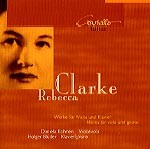Rebecca Clarke’s imposing and wonderful Viola Sonata has been treated fairly well on recordings, and rather than come up with an “exactly-the-same-yet-different” description of the music, I’ll summarize what I already said in my review of Hartmut Lindemann’s excellent performance of the work for Tacet (type Q2387 in Search Reviews): The viola sonata is “a work that if given half a chance would be certain to find a wide and appreciative audience. Its style has been described as ‘English Impressionism’ and indeed, when it was first presented in 1919–she entered it in a competition under a male pseudonym–the judges presumed it to be French, perhaps by Ravel. However, this is not in any way a knock-off of a better-known composer’s style but rather is a substantial, serious, original work that belongs to the viola, exploring numerous facets of the instrument’s voice and technical possibilities while regaling our ears with soaring melodies, a richly mixed harmonic palette, and an overall structure that places the soloist in an effective interactive role with the piano.”
In addition to Lindemann, Barbara Westphal offers her own first-rate interpretation for Bridge (“robust sound, free-flowing legato lines, unbridled lyricism, and a technically assured presentation”), and we get another fine performance here, if not quite as technically accomplished as the others, with sound that’s suitably big and robust, with an impressive viola presence–but with a piano that occasionally overwhelms the viola where it shouldn’t. Nevertheless, listeners who don’t already own one of the other two recommended recordings, or those who haven’t heard this work before will easily be won over to Clarke’s masterpiece.
This disc’s other attraction is its purported inclusion of all of Clarke’s pieces for viola and piano, from a couple of early efforts–two lullabies and an “untitled” work–to her latest in the genre, Passacaglia on an Old English Tune and I’ll bid my heart be still. Violist Daniela Kohnen also adds two of her own transcriptions of works originally for violin. Kohnen’s tone is full and rich, alluring, dark, brilliant, and penetrating–covering the whole range of a viola’s personality. There are moments where her legato is shaky (in Midsummer moon, for example) and her phrasing sometimes lacks the polish of a more mature and confident performer. But overall, this is a very pleasing recital, anchored by solid accompaniment from Holger Blüder’s piano. Kohnen’s arrangement of Chinese Puzzle (Clarke’s adaptation of a “Chinese tune” for violin and piano), is a charming recital closer.
































